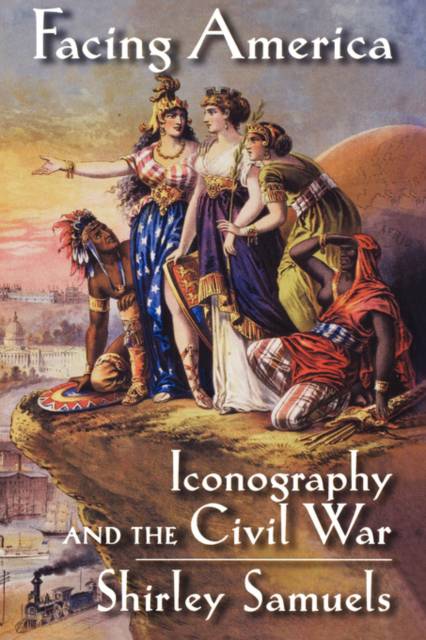
Door een staking bij bpost kan je online bestelling op dit moment iets langer onderweg zijn dan voorzien. Dringend iets nodig? Onze winkels ontvangen jou met open armen!
- Afhalen na 1 uur in een winkel met voorraad
- Gratis thuislevering in België vanaf € 30
- Ruim aanbod met 7 miljoen producten
Door een staking bij bpost kan je online bestelling op dit moment iets langer onderweg zijn dan voorzien. Dringend iets nodig? Onze winkels ontvangen jou met open armen!
- Afhalen na 1 uur in een winkel met voorraad
- Gratis thuislevering in België vanaf € 30
- Ruim aanbod met 7 miljoen producten
Zoeken
€ 209,45
+ 418 punten
Omschrijving
Facing America: Iconography and the Civil War investigates and explains the changing face of America during the Civil War. To conjure a face for the nation, author Shirley Samuels also explores the body of the nation imagined both physically and metaphorically, arguing that the Civil War marks a dramatic shift from identifying the American nation as feminine to identifying it as masculine. Expressions of such a change appear in the allegorical configurations of nineteenth-century American novels, poetry, cartoons, and political rhetoric. Because of the visibility of war's assaults on the male body, masculine vulnerability became such a dominant facet of national life that it practically obliterated the visibility of other vulnerable bodies. The simultaneous advent of photography and the Civil War in the nineteenth century may be as influential as the conjoined rise of the novel and the middle class in the eighteenth century. Both advents herald a changed understanding of how a transformative media can promote new cultural and national identities. Bodies immobilized because of war's practices of wounding and death are also bodies made static for the camera's gaze. The look of shock on the faces of soldiers photographed in order to display their wounds emphasizes the new technology of war literally embodied in the impact of new imploding bullets on vulnerable flesh. Such images mark both the context for and a counterpoint to the "look" of Walt Whitman as he bends over soldiers in their hospital beds. They also provide a way to interpret the languishing male heroes of novels such as August Evans's Macaria (1864), a southern elegy for the sundering of the nation. This book crucially shows how visual iconography affects the shift in postbellum gendered and racialized identifications of the nation.
Specificaties
Betrokkenen
- Auteur(s):
- Uitgeverij:
Inhoud
- Aantal bladzijden:
- 200
- Taal:
- Engels
Eigenschappen
- Productcode (EAN):
- 9780195128970
- Verschijningsdatum:
- 25/03/2004
- Uitvoering:
- Hardcover
- Formaat:
- Genaaid
- Afmetingen:
- 147 mm x 210 mm
- Gewicht:
- 449 g

Alleen bij Standaard Boekhandel
+ 418 punten op je klantenkaart van Standaard Boekhandel
Beoordelingen
We publiceren alleen reviews die voldoen aan de voorwaarden voor reviews. Bekijk onze voorwaarden voor reviews.











